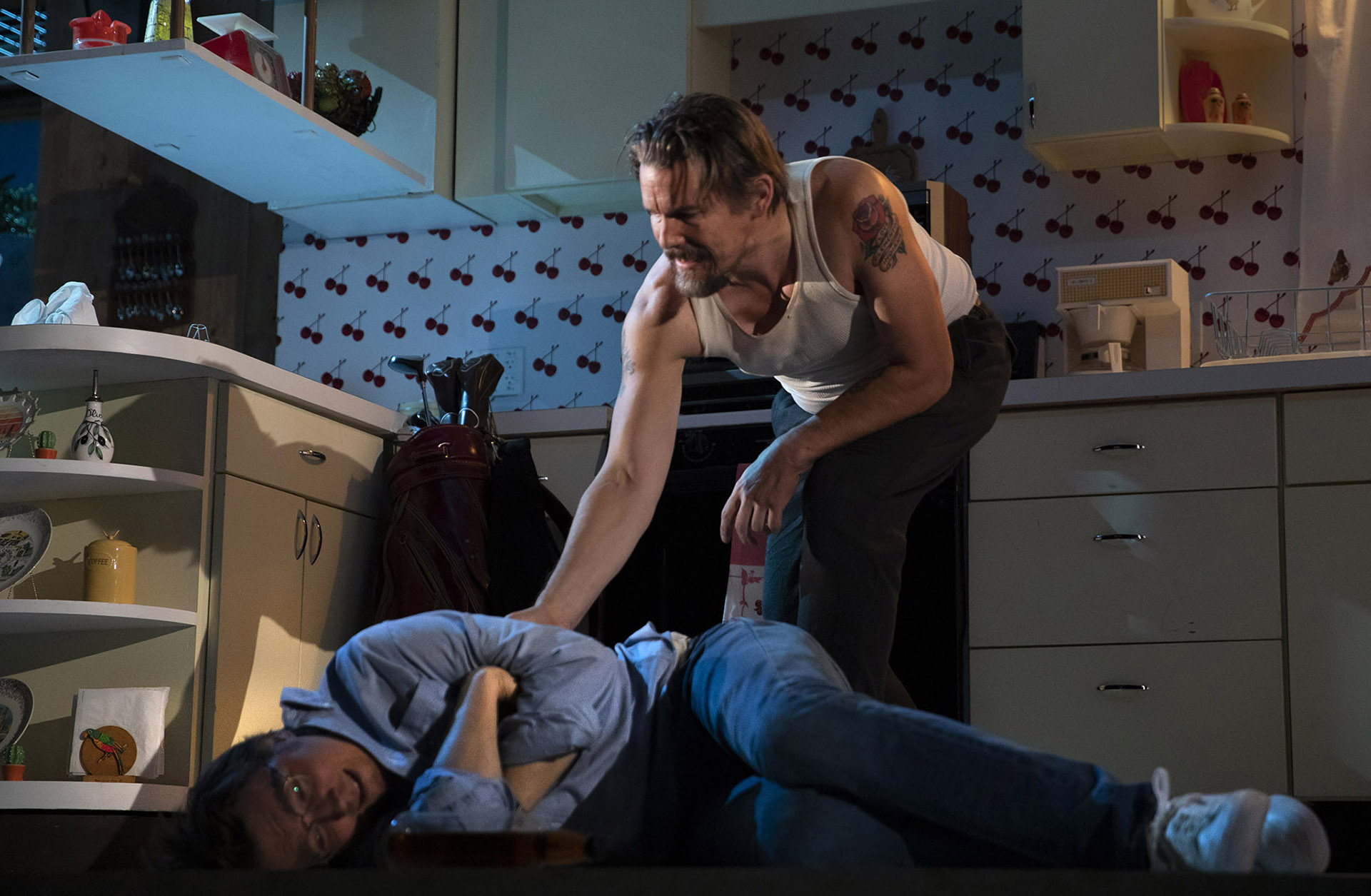Revivals Focus On Rivalries

Riding into the sunset, that’s the way all true cowboy movies end, isn’t it? At least, Sam Shepard seems to have thought so. His popular revivaled “True West,” currently at the Roundabout’s American Airlines Theatre, drives a classic Hollywood chase scene to a heightened level of dark comedy.
Riding in on his metaphysical saddle, Ethan Hawke plays Lee, the feral son, living like a real man, out in the desert. It is an incredible stage role for this actor, and he’s thriving in it. Grossly uncouth — both verbally and physically — he shows up at their mother’s LA home, where his younger brother Austin (played by Paul Dano) is holed up, working on his film script. Austin is reflective and normal, in a nerdy, middle-class kind of way.
When a third character, Austin’s Hollywood producer, Saul Kimmer (Gary Wilmes) arrives, Lee usurps their negotiations, selling Saul on his own movie. The triangulation and competition that occurs move the action to an absurd new level. Driven by their sibling rivalry, Lee becomes the up-and-coming filmmaker, while Austin turns into a sociopath, stealing toasters from the neighbors to prove himself and his capacity to menace.
It’s a slapstick role reversal, set in the natural homeland of all true TV sitcoms. In fact, in the last Broadway revival, starring Philip Seymour Hoffman and John C. Reilly, the actors literally switched roles from one performance to the next.
Here, director John Macdonald mines the metatheatrical nature of the play. Lee’s movie — about cowboys who run out of gas, jump on their horses, and escape to the desert — is pretty much the way things work out for these two brothers.
Jane Cox’s lighting evokes the romanticism of the desert at sunset, and Mimi Lien’s set design gives us a look at L.A. domestic life. The family home, fashioned in middle American style, projects a sense of peacefulness that transforms into strangely embattled terrain. Cloaked in stereotypical wardrobe by Kaye Voyce, Lee looks like he reeks in his dirty desert rags, while Austin is squeaky clean.
As the deal maker who breaks them both, Wilmes is predictably Mephistophelian, albeit in casual disguise. In a story heading to tragedy — these two really want to kill each other — their mother (Marylouise Burke) arrives only to find herself in the midst of utter estrangement. Perhaps, she is the real grave digger here.
Shepard delivers the raw goods for a tale about man in his natural setting. Macdonald elevates the regionality of the piece; this is really “La La Land,” after all. Still, the murderous playpen reality that Hawke and Danes create blends the physical and psychological humor that give this production a hysterical ring of truth.
Dance of Death and Mies Julie
Off Broadway, Classic Stage Company is performing two August Strindberg plays. In “Dance of Death,” an ageing couple in a hateful marriage are pitted against one another in a life and death struggle. Last seen on Broadway in 2001, with Helen Mirren and Ian McKellen, this new translation by Conor McPherson mines the contemporary spirit of Strindberg’s marriage play — its bleak pessimism and absurdity. Written at the turn of the 20th Century, Strindberg’s black comedy was well ahead of its time.
Directed here by the Tony Award-winning musical actor, Victoria Clark (“The Light in the Piazza”), the production moves briskly, with an effecting sense of the brutality in Edgar and Alice’s 25-year marital interment. As Edgar, Richard Topol embodies the misanthropic husband who makes Alice’s every moment unbearable. And, as portrayed by Cassie Beck, the wife plays an active role in making sure their hateful marriage remains that way.
Like “Dance of Death,” “Mies Julie” delves into the notion of the survival of the fittest. In this brilliant and disturbing reimaging of Strindberg’s play, Yael Farber sets the action in 21st Century South Africa, on the day of the annual Freedom Day celebration. Here, the violent romance between Mies Julie (Elise Kibler), and John (James Udom) reflect the country’s ongoing issues of race and class.
Directed by Shariffa Ali, the production is performed in the round on a minimalist set (David L. Arsenault), leaving lots of breathing room for the raw emotional life that pervades. Here, in the most basic living quarters, intense sexual acts, rape, and murder occur around the family dinner table. It’s a visually arresting production, opening with the ethereal figure of John’s maternal ancestor (portrayed by Vinie Burrows) wafting through the kitchen, and his mother pounding through the stones of the kitchen floor, in search of the land that had once been their own.
Visually arresting, the actors are each incredible looking, and their chemistry is explosive. Udom is a powerfully strong looking man; Patrice Johnson Chevannes, as his mother, is so frail she looks like the widow of all of South Africa’s fallen men, and Kibler is fetching, really an eyeful. She’s also a fabulous actor — one to watch out for. Just as dangerous in his way, Udom forces us to experience the volatility of a black man who, having been forced to suffer his fate silently, arrives at a violent end.
That director Shariffa Ali achieves both the political and psychological realities with equal force, creates this most effecting production, as chilling as it is hot.



